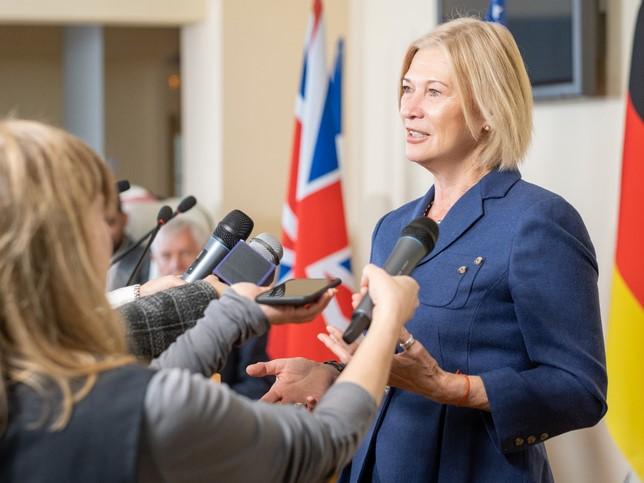
How to convey the benefits of higher education to government and policymakers
You may also like
To convince government leaders and policymakers of higher education’s importance for society we must find ways to highlight the economic, social, and personal benefits of a college degree.
Key points that will help convince politicians and policymakers about the importance of funding and prioritising higher education include:
1. Higher education drives economic growth and competitiveness. A well-educated workforce is more productive, innovative and adaptable to changing market conditions.
2. Higher education promotes social mobility and reduces income inequality. Higher education provides individuals with the skills and knowledge to move up the social and economic ladder.
3. Higher education enhances social cohesion and develops an engaged and informed citizenry.
4. Investing in higher education results in positive economic and social outcomes. It supports the creation of new jobs, increased tax revenue and the growth of local businesses. Universities are major employers in their communities, contributing to local economic development.
As an academic or institutional leader, persuading policymakers and governmental stakeholders to support higher education is a critical yet challenging task. Competing priorities, the complex nature of higher education, funding constraints, the immediacy of tangible results, political considerations, and levels of awareness and understanding can persuade or dissuade government to support higher education. The following are practical suggestions to reach policymakers, present information and communicate key messages effectively:
Identify key decision-makers and stakeholders
To examine higher education policies, start by identifying the key policymakers and stakeholders who hold substantial sway over the relevant domains. This involves scrutiny of legislative committees, governmental departments and other regulatory bodies that dictate the course of action for higher education and research. Organisations for consideration in the US include the Department of Education, Congress, accrediting agencies, state legislatures and governors, and higher education advocacy groups. It is also worth considering which non-governmental organisations, thinktanks and advocacy groups have vested interests in advancing higher education.
- Resource collection: How to promote your research for greater impact
- How to succeed at policy engagement, part two: mapping the landscape
- Writing and presenting reports for government: five dos and five don’ts
Use data, evidence and case studies
Policymakers and government officials are more likely to endorse higher education policies when they contain tangible proof of impact. Hence, to advocate for the advancement of higher education, it is vital to present authentic data, empirical evidence and well curated case studies that convincingly showcase its positive effects on society, the community and the economy. For instance, if socio-economic mobility is the objective; cite studies or data demonstrating the long-term economic benefits of higher education for individuals and wider society. Show how need-based financial aid programmes contribute to upward socio-economic mobility by breaking the cycle of poverty and empowering students to secure higher-paying jobs and contribute to the economy.
Frame your message effectively
When communicating with policymakers, it is important to craft a narrative that resonates with their priorities and concerns. This will vary according to the individual or organisation you are targeting, but a useful approach is to highlight the contributions of your institution, or the sector, in driving economic growth and catalysing social progress within a community or state. Emphasise the pivotal role of a well-educated workforce in driving the region’s economy. Tailor messaging, using relevant examples and data, and emphasising the most important outcomes to targeted policymakers.
For example, when communicating with someone focused on skills development, emphasise the institution or sector’s role in meeting employer demands and preparing students for jobs of the future. Showcase initiatives such as career-oriented programmes, internships and cooperative education that provide students with practical skills and work experience. Present data on employment outcomes of graduates, including job placement rates, salary levels and contributions to critical industry sectors. Highlight collaborations with employers, workforce training programmes and efforts to address skills gaps in the local labour market.
Use multiple communication channels
Spreading your messages via all available communication channels, such as email, events and direct engagement, will broaden the reach of advocacy efforts. Social media platforms such as Twitter, Facebook, and LinkedIn can be an effective vehicle to increase visibility and garner attention from new audiences. Plus, establishing a dedicated website or blog that offers insightful resources and information on your institution, work and the wider sector can be invaluable in advancing the cause or giving credibility to your other communications.
Attend public meetings
Directly engaging with policymakers and government officials at public meetings can be an effective way to advance the higher education policy agenda. Public hearings, town hall meetings and other gatherings that bring together policymakers can offer valuable opportunities for constructive dialogue, building relationships, coordinating with stakeholders, and sharing personal experiences, case studies and research findings. Prepare succinct and impactful talking points and be ready to clearly articulate the data and evidence relating to higher education policies.
Partner with businesses and non-governmental organisations
Strategic partnerships with businesses and non-governmental organisations can enhance advocacy efforts by amplifying the messages and extending influence. Identify and collaborate with organisations and businesses that share a vested interest in the success of higher education. Partnering with industry associations can strengthen the advocacy for higher education by highlighting the relevance of education in meeting workforce needs and driving economic growth. Collaborating with non-profit organisations dedicated to the advancement of education results in louder messaging, wider networks and greater influence. Joint research projects, advocacy campaigns and community outreach initiatives can leverage each partner’s unique strengths and resources.
Encourage student-generated campaigns
Recognise the power of student advocacy and empower them to advance the higher education agenda. With the right resources, training and opportunities to reach policymakers, students can be dynamic advocates for the sector. Student-led campaigns could take various forms, from well-orchestrated letter-writing campaigns and social media outreach to rousing rallies and demonstrations. Institutions should support these efforts.
Join networks that advocate for similar causes
Join groups with a shared commitment to your key objectives to build a more cohesive and stronger advocacy strategy with greater reach. One group that advocates for higher education in the US is the Association of Public and Land-grant Universities (APLU). The APLU is a research, policy and advocacy organisation representing public research universities, land-grant institutions and state university systems. Institutions can leverage the group’s collective expertise, resources and networks to build their campaigns.
Jamie Gilbert Mikell is assistant professor of kinesiology, health and physical education at Athens State University.
If you found this interesting and want advice and insight from academics and university staff delivered direct to your inbox each week, sign up for the THE Campus newsletter.




